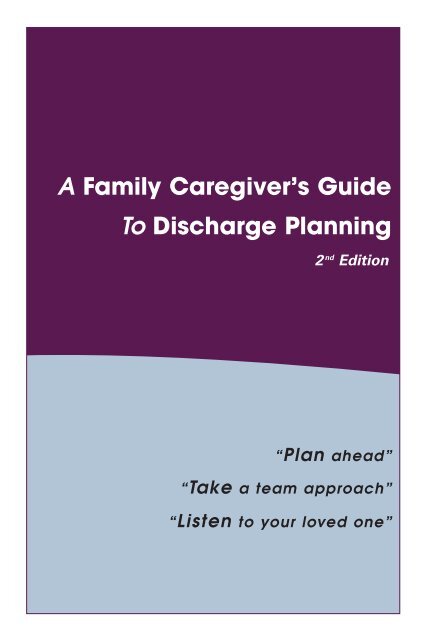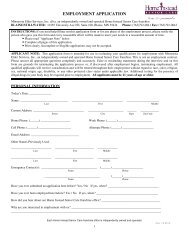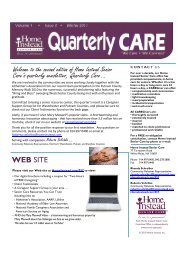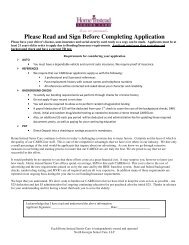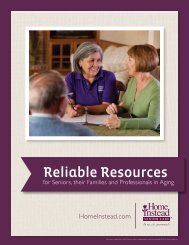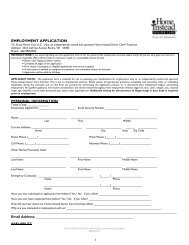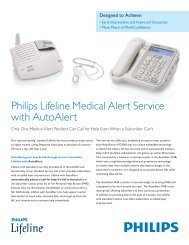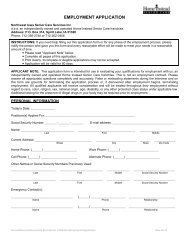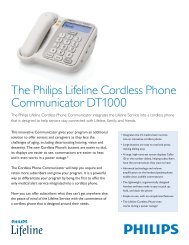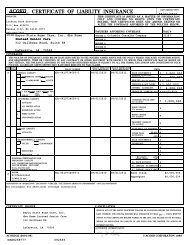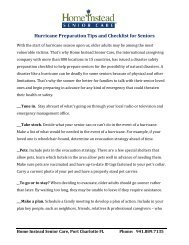Senior Brochure In Order (Lexington).pdf - Home Instead Senior Care
Senior Brochure In Order (Lexington).pdf - Home Instead Senior Care
Senior Brochure In Order (Lexington).pdf - Home Instead Senior Care
- No tags were found...
Create successful ePaper yourself
Turn your PDF publications into a flip-book with our unique Google optimized e-Paper software.
A Family <strong>Care</strong>giver’s Guide<br />
To Discharge Planning<br />
2 nd Edition_<br />
“Plan ahead”<br />
“Take a team approach”<br />
“Listen to your loved one”
A Family <strong>Care</strong>giver’s Guide<br />
To Discharge Planning<br />
An elder loved one or disabled person is entering a hospital or nursing<br />
facility. Whether this is a planned event or due to an emergency, it is never<br />
an easy time. Usually, the condition of your loved one will improve to the<br />
point where they are able to return home. The transition back to a home<br />
environment is also not easy. With a little planning, however, there is a great<br />
deal that you can do to simplify the process.<br />
Who this guide is for<br />
This guide is intended for any caregiver who is helping an elderly loved one<br />
or disabled person return home from a medical facility.To simplify language<br />
within this guide, the patient is referred to as either “he” or “she” though the<br />
information is not geared towards a specific gender.<br />
What is discharge planning<br />
Discharge planning includes all the steps taken to ensure that your loved<br />
one makes a safe transition from a hospital or nursing facility back to their<br />
home environment (a home can be a single family residence, an in-law<br />
apartment, senior living community or an assisted living facility). Discharge<br />
planning is not a single meeting but rather a sequence of events. With the<br />
right team of people, the goal is to assess what your loved one’s needs are<br />
and develop a plan that will bring him home safely.<br />
When should discharge planning begin<br />
As soon as possible. The key is to plan ahead. Sometimes, there will be<br />
circumstances that make it impractical to begin thinking about a<br />
discharge plan. If your loved one has suffered some sort of trauma or if you<br />
have no idea how long she will be at a hospital, you may need to wait for<br />
additional information before you can start thinking about next steps.<br />
<strong>In</strong> other situations, you may know right away that the person you are caring<br />
for will be ready to return home within a few days. <strong>In</strong> this scenario, you<br />
should begin thinking about the discharge plan right away. Fortunately,<br />
there are people to help.<br />
- 1 -
Who is involved<br />
Discharge planning may involve some or all of the following people:<br />
• Patient<br />
• Family <strong>Care</strong>giver or Friend*<br />
• Physician<br />
• Social Worker<br />
• Case Manager/Discharge planner<br />
• Nurse(s)<br />
• Other medical staff such as physical or occupational therapy<br />
• Local Ombudsman<br />
* Try to designate one person from the family who can act as a central<br />
point of contact for the hospital or nursing facility.<br />
What to expect from a discharge planner<br />
A discharge planner will help provide a plan that will safely transfer your<br />
loved one from a medical facility to a home environment. They can also<br />
put you in touch with community resources and provide information that<br />
will make it easier to care for your loved one at home.<br />
What not to expect from a discharge planner<br />
If your loved one is going to another facility, it is best to research this facility<br />
on your own. Also, when scheduling a discharge meeting, remember that<br />
most discharge meetings will happen Monday – Friday, 9am – 5pm.<br />
So where do I start<br />
Step 1. Learn about the facility. When your loved one enters a hospital or<br />
nursing home, ask to speak with the person who will be managing their<br />
discharge plan. Ask what you should bring to the initial meeting (this may<br />
include a healthcare proxy, power of attorney, insurance cards and<br />
financial information).<br />
Step 2. Gather background information. Prepare for your discharge<br />
meeting by writing down important facts about your loved one’s condition<br />
prior to when they entered the hospital. Some questions that may be<br />
addressed include: What was your loved one’s condition like before they<br />
entered the medical facility How was their appetite How was their shortterm<br />
and long-term memory How was their temperament Answering these<br />
questions will give staff members a baseline by which to gauge your loved<br />
one’s progress.<br />
- 2 -
Step 3. Assess needs. For the near term, can your loved one be left<br />
alone Who will manage their finances When your loved one returns<br />
home, who will manage the grocery shopping and cleaning It is a good<br />
idea to make a list of all the things that you feel will be necessary to assist<br />
your loved one for the 3 months following their return home. Go through the<br />
list and determine which things you and other family members can handle<br />
and which things you will need help with. Remember to be flexible. Over<br />
time, new things may be added to your list and some will be eliminated.<br />
Step 4. What new skills will you need to learn Sometimes, caregivers<br />
may need to learn how to assist their loves ones in new and unfamiliar ways.<br />
Potential assistance could include: assistance with transfers, how to oversee<br />
medications or how to help with a catheter bag. If you need to learn about<br />
these things, make an appointment with the facility staff prior to the<br />
discharge day. This will avoid having a training session that is rushed. It will<br />
also give you a chance to ask questions and become more comfortable<br />
with your new responsibilities.<br />
Step 5. Meet with facility staff. Your discharge planning meeting is the<br />
opportunity to answer most of your questions. This guide contains 14 of the<br />
most common questions that you may have regarding a patient<br />
discharge. If your loved one is in a skilled nursing facility, try to schedule this<br />
meeting at least one week prior to discharge to allow for any additional<br />
work that needs to be done. Stays in the hospital are typically shorter but it<br />
is ideal if you can plan at least a couple of days in advance. <strong>In</strong> either case,<br />
be sure to get the names of appropriate staff that you will meet with on the<br />
day of discharge and ask about the transportation arrangements to get<br />
your loved one home.<br />
Step 6. Final planning.<br />
• Get dates for follow up appointments<br />
• Coordinate home care services that are not covered by<br />
Medicare/Medicaid<br />
• Ensure that appropriate safety measures have been taken at home<br />
(see list)<br />
• Ask the discharge planner if suitable transportation can be provided to<br />
get your loved one home safely (Medicare may or may not cover a<br />
transport home)<br />
• Be prepared to be flexible!<br />
- 3 -
14 Questions to ask in a discharge planning meeting<br />
1. Update on current condition and anticipated recovery _____<br />
2. Expected discharge date and time _____<br />
3. Name of doctor(s) who may authorize the discharge _____<br />
4. Complete list of medications and instructions _____<br />
5. Other necessary services (i.e. <strong>Home</strong> <strong>Care</strong>) _____<br />
6 What equipment is needed (i.e. shower seats, grab bars,<br />
hospital bed) _____<br />
7. If leaving a Nursing Center and there is rehabilitation,<br />
will a rehab specialist be able to make a home assessment _____<br />
8. Exercise routine _____<br />
9. Danger signs and how to deal with them _____<br />
10. Follow-up appointments needed after discharge _____<br />
11. A contact person for more advice, information or help _____<br />
12. What services will be sent home (i.e. Visiting Nurse) _____<br />
13. Dates for when the Visiting Nurse or other services will come _____<br />
14. Nutritional suggestions (include dietary restrictions) _____<br />
14 Planning steps to bring your loved one home<br />
(check those that are applicable)<br />
1. Throw away expired food and restock the refrigerator _____<br />
2. Dispose of old and expired medications (including over the<br />
counter meds)_____<br />
3. Complete medication list and medication pick up or delivery _____<br />
4. Set up pill box (see if the pharmacist can do this) _____<br />
5. A plan to ensure meds are being taken properly _____<br />
6. Remove throw rugs that cause falls _____<br />
7. Shower seat and non slip floor mat _____<br />
8. Hand held shower head _____<br />
9. Grab bars _____<br />
10. Raised toilet seat _____<br />
11. Night light _____<br />
12. Test smoke & carbon monoxide detectors _____<br />
13. Winchester Hospital Lifeline (781) 756-4752 _____<br />
14. Transportation to get your loved one home_____<br />
Questions<br />
Check List<br />
- 4 -
What sort of costs can I expect<br />
Medicare is our country’s health insurance program for most people age<br />
65 or older. The program helps with the cost of health care, but it does not<br />
cover all medical expenses associated with non-medical care. For<br />
additional information, the Federal Government prints a guide titled<br />
Medicare & You that explains in detail what benefits seniors are eligible for.<br />
For a copy of this guide or for more information:<br />
• Call 1-800-MEDICARE (1-800-633-4227)<br />
• Visit www.medicare.gov on the web<br />
Many people are surprised to learn that Medicare will not cover all of the<br />
costs associated with taking care of someone at home. It is a good idea to<br />
ask your discharge planner what is and isn’t covered with respect to your<br />
loved one’s care. Also keep in mind that the Visiting Nurse Association is a<br />
good resource but these services do not last indefinitely.<br />
Local Offices on Aging.<br />
Your local office on aging is an excellent resource for elders, families,<br />
caregivers and health care professionals. The offices below provide a<br />
variety of services including information and referral and ombudsman<br />
programs which advocate for people with loved ones in nursing facilities.<br />
Local Aging Office Phone Number Towns Served<br />
Minuteman <strong>Senior</strong><br />
Services<br />
(888) 222-6171<br />
www.minutemansenior.org<br />
Arlington, <strong>Lexington</strong>,<br />
Winchester, Woburn<br />
Springwell Elder<br />
Services<br />
(617) 926-4100<br />
www.springwell.com<br />
Belmont<br />
Mystic Valley ELder<br />
Services<br />
(781) 324-7705<br />
www.mves.org<br />
Medford<br />
- 5 -
Do you need transportation home for a<br />
patient being discharged<br />
Contact:<br />
<strong>Home</strong> <strong>In</strong>stead <strong>Senior</strong> <strong>Care</strong>’s<br />
<strong>Home</strong> Safe Service<br />
$60 for transportation home and up to 3 hours<br />
assistance getting settled.<br />
781-402-0060<br />
Serving: Arlington, Belmont, <strong>Lexington</strong>,<br />
Medford, Winchester and Woburn<br />
- 6 -
Important tips<br />
While your loved one is trying to get better, your job is to think about next<br />
steps. Being discharged does not mean that your loved one is cured of<br />
whatever they entered the hospital for in the first place. Don’t try to do<br />
everything at once. Avoid making decisions under pressure. Take time to<br />
consult with people you trust and think through decisions.<br />
1. Listen to your loved one. Always remember who this discharge plan<br />
is for. To the extent possible, include your loved one in the decisions you are<br />
making on their behalf. Even if they have difficulty giving input, they will<br />
appreciate knowing that efforts were made to consider their feelings.<br />
2. Get a notebook. Try to get one which has a calendar and an inside<br />
sleeve where you can file papers. Use this to keep track of important<br />
names, numbers and dates. Also, use your notebook to keep a record of<br />
important conversations with health care professionals.<br />
3. Be realistic about how much you can do. Taking on additional<br />
responsibilities can be stressful. Do not try to tackle too much at once.<br />
Assess how much you and other family members will be able to help after<br />
your loved one comes home. If you are not comfortable helping with<br />
intimate personal hygiene or other aspects of the care plan, be vocal<br />
about saying so. Remember to be realistic!<br />
Disclaimer<br />
<strong>Home</strong> <strong>In</strong>stead <strong>Senior</strong> <strong>Care</strong> and its franchisees do not assume legal liability<br />
or responsibility for the accuracy, completeness, or usefulness of any<br />
information, contained in this pamphlet.<br />
For information on home care services, please call:<br />
<strong>Home</strong> <strong>In</strong>stead <strong>Senior</strong> <strong>Care</strong><br />
5 Militia Drive<br />
<strong>Lexington</strong>, MA 02421<br />
781-402-0060<br />
www.homeinstead.com/404<br />
jack.cross@homeinstead.com<br />
- 7 -
Notes<br />
______________________________________<br />
______________________________________<br />
______________________________________<br />
______________________________________<br />
______________________________________<br />
______________________________________<br />
______________________________________<br />
______________________________________<br />
______________________________________<br />
______________________________________<br />
______________________________________<br />
______________________________________<br />
______________________________________<br />
______________________________________<br />
______________________________________<br />
______________________________________<br />
______________________________________<br />
______________________________________<br />
______________________________________<br />
______________________________________<br />
______________________________________<br />
- 8 -
Notes<br />
Key Contacts:__________________________ _<br />
______________________________________<br />
______________________________________<br />
______________________________________<br />
______________________________________<br />
______________________________________<br />
______________________________________<br />
______________________________________<br />
______________________________________<br />
______________________________________<br />
Important Dates:_________________________<br />
______________________________________<br />
______________________________________<br />
______________________________________<br />
______________________________________<br />
______________________________________<br />
______________________________________<br />
______________________________________<br />
______________________________________<br />
______________________________________<br />
______________________________________<br />
- 9 -
<strong>Home</strong> <strong>In</strong>stead <strong>Senior</strong> <strong>Care</strong><br />
5 Militia Drive<br />
<strong>Lexington</strong>, MA 02421<br />
781-402-0060<br />
www.homeinstead.com/404<br />
- 10 -
For information on home care services, please call:<br />
<strong>Home</strong> <strong>In</strong>stead <strong>Senior</strong> <strong>Care</strong><br />
5 Militia Drive<br />
<strong>Lexington</strong>, MA 02421<br />
781.402.0060<br />
www.homeinstead.com/404


